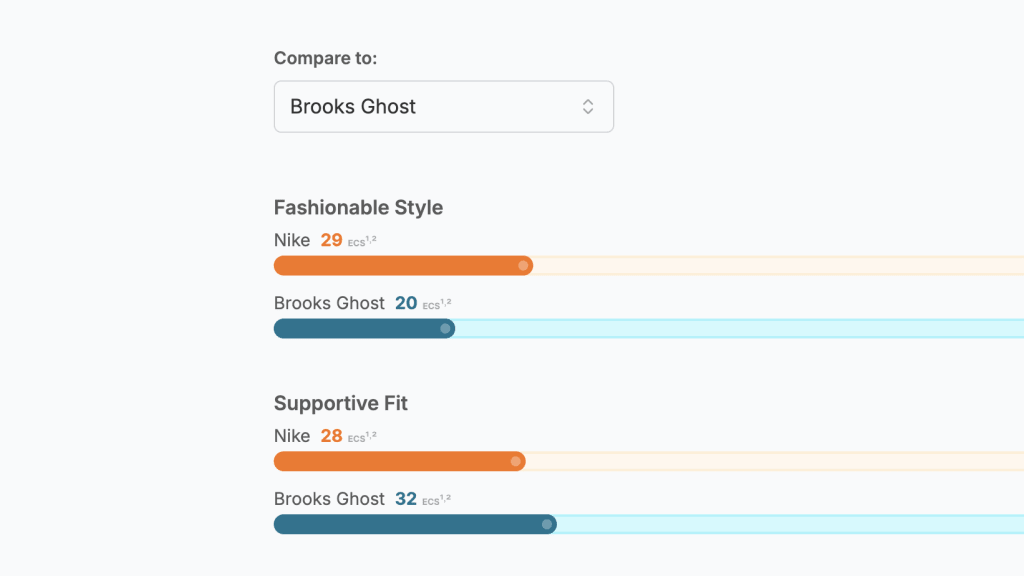Compare your brand to peers with ECS comparison
Compare your brand to your peers through the eyes of ChatGPT and Google Answers

In today's competitive marketplace, understanding where your brand stands relative to competitors is crucial for differentiation and success. To help brands gain deeper insights into their positioning, we are thrilled to introduce our new feature: the Embedding Cosine Similarity (ECS) Comparison Tool.
What is Embedding Cosine Similarity (ECS)?
For those unfamiliar, Embedding Cosine Similarity (ECS) is an AI technique that measures the similarity between concepts through the eyes of an AI chatbot (LLM) such as ChatGPT. In this case, ChatRank uses ECS to determine how much a concept or quality is associated with your brand.
Why ECS Matters
Understanding ECS scores empowers brands to:
Recognize Strengths and Weaknesses: By comparing ECS with competitors, you can pinpoint which aspects of your brand resonate strongly with customers and where there is room for improvement.
Identify Opportunities for Differentiation: A close similarity score may signal the need to differentiate your offerings more clearly, potentially finding a niche that is currently under-served in the market.
Enhance Strategic Planning: ECS insights can guide branding, marketing strategies, and product development by focusing efforts on high-impact areas.
Benchmarking Against Peers: Regularly comparing ECS allows brands to track their growth and adjust strategies in response to industry trends and consumer expectations.
How to Use the ECS Comparison Tool
Using our ECS Comparison Tool is straightforward and user-friendly:
Input Your Brand Data: Simply upload key data about your brand—such as mission statements, customer reviews, and key product descriptions.
Select Peer Brands: Choose the brands you wish to compare against from an extensive database of competitors in your industry.
Analyze Results: The tool generates a comprehensive similarity score, accompanied by detailed reports highlighting key differentiators and overlaps. Real-World Applications
Imagine you're a startup in the eco-friendly skincare industry. You position your brand as sustainable and ethically sourced, but how do you stand out among dozens of similar brands? With the ECS Comparison Tool:
Identify Unique Brand Values: Discover that while many competitors focus on organic ingredients, fewer highlight eco-friendly packaging, allowing you to capitalize on this angle.
Tailor Marketing Campaigns: Use this insight to develop marketing strategies that highlight your distinctive values, such as a campaign that emphasizes the recyclability of your packaging.
Refine Product Offerings: Realize the potential demand for innovative products like reusable containers, positioning your brand as a leader in sustainability.
Looking Ahead
Our ECS feature not only helps brands track their current standing but also enables dynamic adjustments to maintain a competitive edge. As industries evolve, so do consumer expectations. By regularly revisiting your ECS scores, you ensure your brand remains relevant and aligned with market trends.
In conclusion, the ECS Comparison Tool is a game-changer for brands aiming to define and refine their market positioning. By understanding the nuances of your ECS scores, you'll be better equipped to innovate, differentiate, and ultimately succeed. We invite you to explore this powerful tool and discover the pathways to elevate your brand in an ever-changing landscape.
Tell Us Your Story
We are eager to hear how this feature impacts your brand journey. Share your experiences and insights by joining the conversation on our community forums or through social media. Together, let’s navigate the future of brand strategy with precision and purpose.


We’ve been using ChatRank for 34 days, and following their plan, we’ve actually grown over 30% in search visibility

ChatRank helped us go from zero visibility to ranking #2 in a core prompt for our business with only one new blog post!

